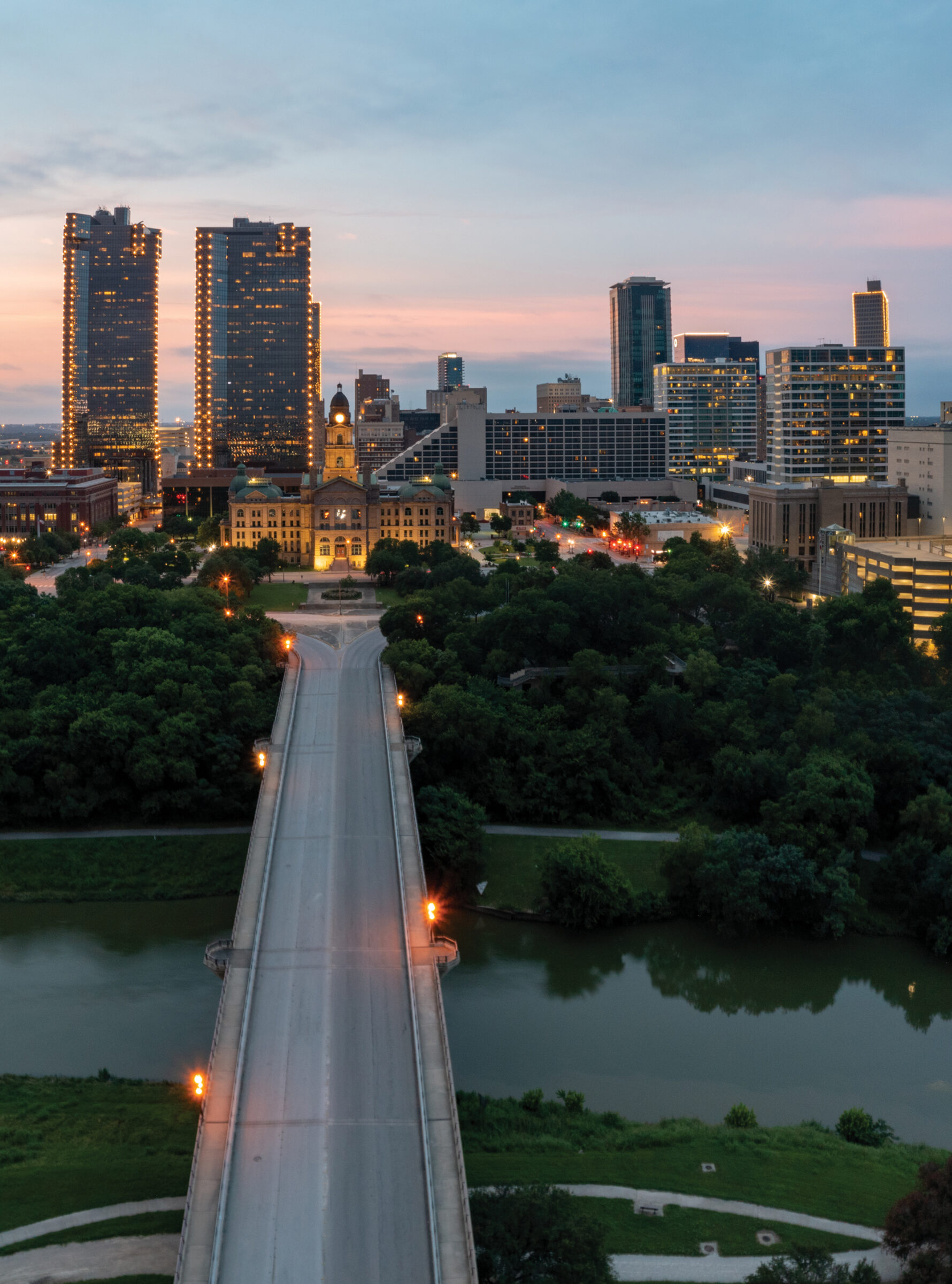The city of Fort Worth used to take a backseat to larger Texas metros such as Austin, Houston, San Antonio and its sister city, Dallas. Today, Fort Worth is in the driver’s seat, thanks in part to growing at a faster rate than all of those other Texas cities over the past 12 years.
As the 13th largest city in the U.S. and fifth largest in the state, Fort Worth continues to position itself for exponential growth as regional development, entrepreneurship and innovation bloom across all sectors.
In 2017, when it was merely the nation’s 15th largest city, Fort Worth launched its first economic development strategic plan. The goals of the original plan were to establish a competitive edge in Fort Worth, become a hub for creative businesses and ensure community vitality. Fast-forward five years, and the city has done just that. In the current plan, aerospace and defense, energy, anchors and innovators, mobility and culture remain top of mind as the city pioneers a visionary business landscape.
“We have a number of innovative companies in Fort Worth that value an environment where they’re able to explore and partner across industries to make advancements in business operations,” says City of Fort Worth Economic Development Director Robert Sturns. “Fort Worth tends to be a very relationship-driven city, and that shows through the levels of collaboration we have seen in our business community.”
Entrepreneurship
Brad Hunstable is CEO of Linear Labs, a sustainable electrification systems manufacturer that has been a vital part of Fort Worth’s energy sector for over a decade. The startup company knows the city is rich with advantages that help an advanced manufacturing company thrive. The region’s central location and infrastructure, talent base and vendors are essential components that aided in the success and expansion of his business. In 2020, the company entered a $68.9 million tax incentive program partnering with the city to receive property tax credits and sell them to companies who could benefit from the credits. “This is just a great example of how the city of Fort Worth is thinking ahead and being innovative,” says Hunstable. He notes that the city’s willingness to collaborate with big name and startup companies establishes the thriving business ecosystem Fort Worth aims to facilitate.
“One of the great things about Fort Worth’s target industries is the synergy, and how so many of them work together to support one another.”
— Robert Sturns, City of Fort Worth Economic Development Director
TechFW, a startup incubator, works to help businesses such as Revitalize Charging Solutions make a name for themselves as manufacturers in the energy industry. As mobility gears toward EVs, the city works alongside Revitalize Charging Solutions to provide charging infrastructure to satisfy requirements for those vehicles. As one of the few African-American-led companies in this space, the company benefited from support from economic development officials. “Anytime you have a new product sometimes it’s a challenge getting people to support you. They gave us an opportunity,” says Revitalize Charging Solutions CEO Edward Morgan. “There are really great people in Fort Worth, from the parking department through economic development, and I believe there is great opportunity for Fort Worth to be a leader in this space.”
Healthcare Innovation
When it comes to innovation, the University of North Texas Health Science Center at Fort Worth (HSC) is at the forefront of testing new technology and cultivating collaborative relationships that strengthen the future of healthcare.
HSC opened its new regional simulation center in July 2022, integrating virtual reality technology — the first of its kind in Texas — for students and healthcare workers in the community to have a low-stakes environment to practice their skills. “They can practice in the SIM lab in a safe place, where it’s okay to make a mistake. It’s not our clinical environment, yet it feels like it,” says HSC Simulation Center Director Karen Meadows. The new 16,000-sq.-ft. space allows for greater capacity with more rooms to practice skills one-on-one or in a collaborative environment. These capabilities allow the lab to stimulate more than just medicine, impacting the future of healthcare and training. “I think there are lots of synergies between testing out things that you want to take to market in a healthcare setting, but having a place to do that in a safe spot where you aren’t harming patients. That’s a great opportunity to attract people to the center, to the area and the research possibilities,” says Meadows.
Beyond a collaborative workspace, HSC and the city provided funding for Techstars, a global investment business, to launch Techstars Physical Health Fort Worth Accelerator led by Managing Director Trey Bowles. “It’s amazing to see not only the financial commitment, but the strategic priority that the city, the county and Health Science Center are putting around making sure people see the innovation that’s happening here,” says Bowles. “They want Fort Worth to continue to grow as a leading hub for innovation and entrepreneurship across the world.” With over 1,500 applicants relating to physical health startups, Techstars will invest and provide mentorship to 10 early-stage entrepreneurs.
Reimagining Fort Worth
With significant growth on the horizon, city economic development officials have identified opportunities to develop a sustainable urban downtown. Panther Island, north of downtown Fort Worth, has entered phase one to create 10,000 housing units and 3 million sq. ft. of commercial, retail and educational space along the Trinity River for residents to gather and live in a once derelict industrial area.
Catering to increased demand for hotels and in-person collaboration space, the renovation and expansion of the Fort Worth Convention Center is expected to spur private development of a new, adjacent 1,000-room convention hotel. Commerce Street will also introduce Deco969, a 27-story residential high-rise with 302 apartments and 8,000 sq. ft. of retail space.
Fort Worth remains one of the fastest growing cities in the U.S., adding over 22,000 residents in 2021. Rest assured they’re making room for you too.
“There are several game-changing projects in progress in our Downtown,” says Fort Worth Mayor Mattie Parker. “With Panther Island set to nearly double downtown’s footprint, Texas A&M University planting a world-class center for research and innovation, a massive expansion to the Convention Center in progress, and more residential development on the way, Downtown is transforming before our eyes.”
This Investment Profile has been prepared under the auspices of the City of Fort Worth. For more information, visit itbeginsinfortworth.com.

